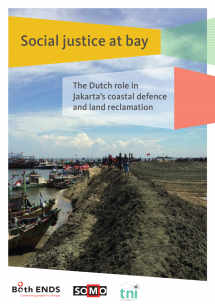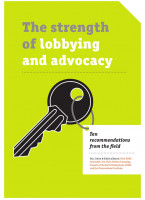A multi-billion infrastructure project is underway in Indonesia that is meant to protect the city of Jakarta against future flooding. The Master Plan for the National Capital Integrated Coastal Development programme (NCICD) was drawn up by a consortium of Dutch engineering and consultancy companies. The Dutch government, through its development aid budget, has supported the design phase and is likely to remain closely involved with this prestigious project. It is a prime example of the shift in Dutch development policies as laid down in the New Agenda for Aid, Trade and Investment.
However, research by SOMO, Both ENDS and TNI shows that the NCICD and related projects in Jakarta Bay are likely to damage the environment and could threaten the livelihoods of tens of thousands of people who rely on the local fishing industry. Local civil society organisations are deeply concerned that they have not been involved in the planning and design of this large-scale infrastructure and real estate project. In 2014, they joined forces with other affected groups and formed the ‘Save the Jakarta Bay Coalition’.
No one questions that protecting Jakarta against floods is becoming increasingly urgent and that action is needed. This research report, however, raises serious questions as to whether the Dutch government, in its support of the NCICD, sufficiently balances its interest in supporting Dutch companies with its stated policies of sustainable and inclusive development. Implementation of the current NCICD Master Plan will not offer the people of Jakarta a solution that is socially, environmentally and financially sustainable in the long term.
On multistakeholderism
In keeping with other global governance processs, infrastructure development that effects fisheries is increasingly characterised by ‘multi-stakeholderism’, where fundamentally opposing interests and acute power imbalances are glossed over. Multi-stakeholderism assumes that these differences can be resolved through compromise, in order to bring all ‘stakeholders’ to the same table.
There is however, a crucial distinction between ‘stakeholders’ (anyone who can claim a ‘stake’ in a process) and human rights holders (those for whom the realisation of their human rights is inextricably linked to their customary and socially defined rights to fishing grounds and/or for whom conflicts over fisheries affect their human rights). Such distinctions should be respected.
As the roadmap rolls out then, it is important to recall a core principle in the SSF-guidelines: the prioritization of vulnerable and marginalized groups in all decision-making processes. This approach stands in contrast to the ‘multistakeholder approach’ envisioned in Marine Spatial Planning, where all actors are reduced to ‘stakeholders’. In this view, fisher communities lives and livelihoods are put on par with the economic interests of private sector actors – following the assumption that both parts are equal stakeholders. Furthermore, it glosses over fundamentally differing interests and positions under the assumption that they can be resolved through compromise.



